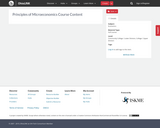
- Subject:
- Economics
- Social Science
- Material Type:
- Unit of Study
- Provider:
- Ohio Open Ed Collaborative


Looks at fiscal policy as a means to address problems in the macroeconomy. Focuses on government spending as well as taxes and transfers in the Keynesian model, as well as determinants of the level of Aggregate Demand.

The Principles of Microeconomics course was developed through the Ohio Department of Higher Education OER Innovation Grant. This work was completed and the course was posted in December 2019. The course is part of the Ohio Transfer Assurance Guides and is also named OSS004. For more information about credit transfer between Ohio colleges and universities, please visit: www.ohiohighered.org/transfer.Content ContributorsKen Fah Ohio Dominican UniversityJohn Fiske Ohio Dominican UniversityJoe Nowakowski Muskingum UniversityLibrarianNathan Wolfe Kenyon CollegeReview TeamMolly Cooper Ohio State University Subbu Kumarappan Ohio State University ATI

Think-Pair-Share activities pose a question to students that they must consider alone and then discuss with a neighbor before settling on a final answer. This is a great way to motivate students and promote higher-level thinking. Even though the activity is called think-"PAIR"-share, this is the term many instructors use for pairs and small groups (three or four students) alike. Groups may be formed formally or informally. Often this group discussion "sharing" is followed up with a larger classroom discussion. Some think-pair-share activities are short, "quick-response think-pair-share" and sometimes the activities may be longer and more involved, "extended think-pair-share." The instructor can use the student responses as a basis for discussion, to motivate a lecture segment, and to obtain feedback about what students know or are thinking and it is easy to incorporate more than one think-pair-share activity in a given class period.